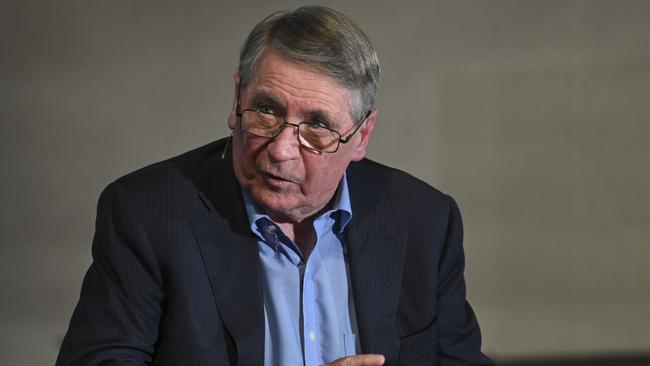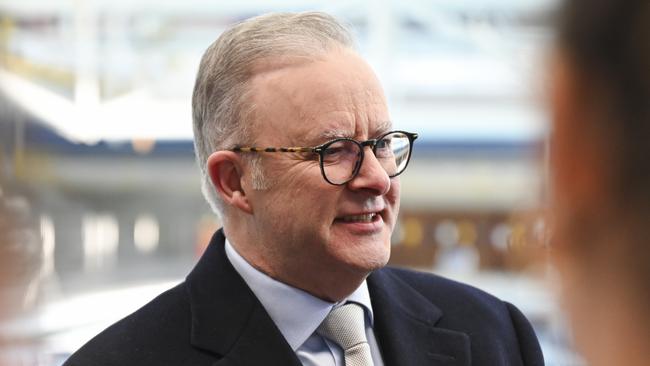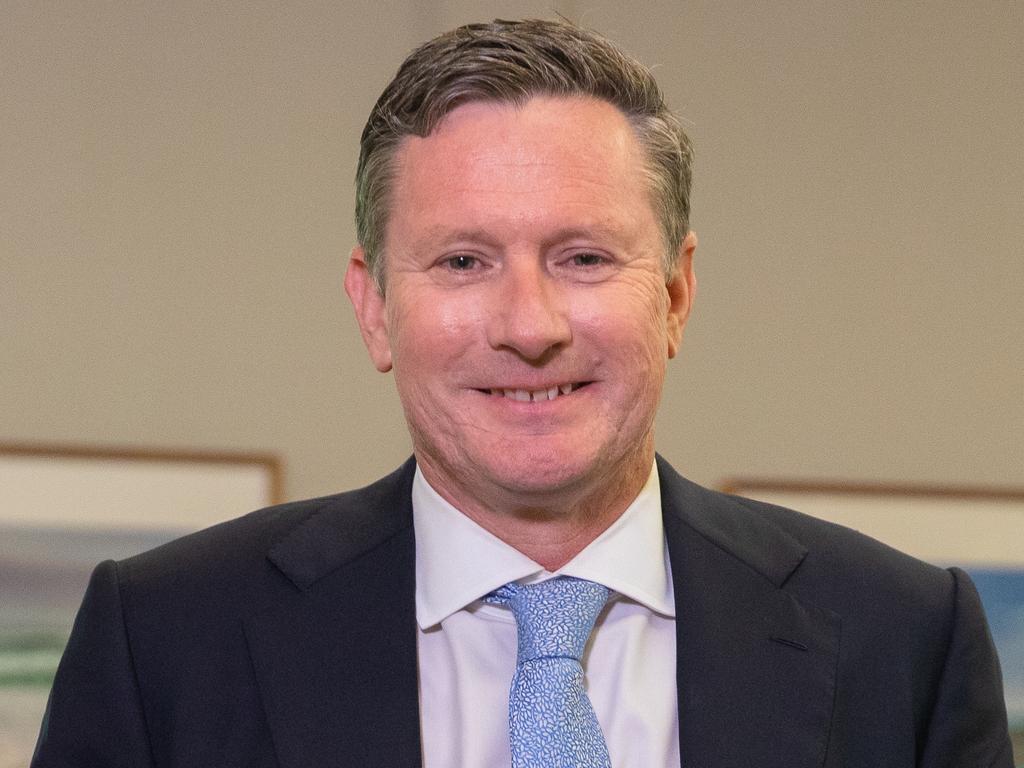
The consequences of this transformation and its scale are contested, but it has gathered pace under the Albanese Labor government, with its great incarnation being the flagship Future Made in Australia agenda.
Setting out the intellectual foundation for the policy, Jim Chalmers told the Lowy Institute last month that “economic resilience is an essential component of assuring our national security”.
Among the nation’s top-serving and former bureaucrats there is near universal agreement that a national security lens is being applied to growing areas of public policy to deal with a more challenging world.
The revolution means economic efficiencies are more frequently sacrificed to fortify sovereign capabilities, raising concerns national security becomes a catch-all justification for bigger spending and bigger government.
Greater attention must be paid to whether this serves a government’s political interest or the national interest.
Chair of the Superpower Institute and former competition tsar Rod Sims tells Inquirer that “using national security as the logic for wider public policy decisions is extremely risky”.
“It justifies everything, and therefore nothing. Strong, explicit guardrails are needed if costly errors are to be avoided,” he said, adding: “I think it’s a worrying development.”
In a landmark speech earlier this month, Treasury Secretary Steven Kennedy declared that “economic and financial tools are being deployed much more aggressively to promote and defend national interests”. Referencing the China challenge, he said “when a nation state is seeking to dominate particular markets for broader aims, the response should not be viewed primarily through an economic lens, but through a national security lens”.
“In the case where the goods are genuinely critical to global prosperity and security, and where the actions of one large country are distorting the efficiency operation of the market, preventing long-term investment and diversification, we and trading partners should not stand idle.”
Such comments backing selective government interventions would have been surprising coming from a Treasury secretary even as recently as five years ago.
Speaking in April to unveil the Future Made in Australia gear-shift, Anthony Albanese said “the game has changed – and the role of government needs to evolve”.

Director-General of the Office of National Intelligence Andrew Shearer has argued “we cannot provide security without bringing in a whole-of-nation approach”.
Shearer enjoys a close network of relationships across the full spectrum of government – including in the non-national security portfolios – in addition to the private sector and speaks regularly with Kennedy. The pair have been meeting more often to discuss the merging of economic and security priorities, with the intelligence chief revealing they were “working together in a completely different way”.
DFAT Secretary Jan Adams has declared in recent weeks that “the economic and the strategic are well and truly intertwined” and this means “policymakers have to expand the types of factors that are brought to bear on decision-making in any particular area”.
“China’s rise up the value chain, up the technology chain, means that geostrategic competition is also economic and technological competition.
“My point here really is that the international context is already fusing security and economic issues,” Adams says.
“As a practitioner, I think what that means at a bureaucratic level is that there really is a premium on breaking down those ‘silos’ (and) on being as connected bureaucratically as we can be.”
Former ASIO boss Dennis Richardson likens the integration of national security across policy making to a new experiment, telling Inquirer that “over the past few years … there has been a widening and there has been greater awareness of the importance of decision-making for national security by ministers beyond the traditional national security community”.
“It’s still a work in progress … How far we do go in the integration is going to be the challenge. Where is that sweet spot? Where is the point of integration where we are legitimately meeting our national security interests while, at the same time, not compromising, beyond a certain point, economic growth,” he said.
Richardson is cautious about military and security specialists being handed control of the nation’s economic levers, arguing the “last thing you would want is for the national security community to have the dominant say in broader government policy”.
“That would be a recipe for economic regression, significantly lower growth and declining prosperity. I don’t think there’s anyone who would argue that we should go that far.” His view differs from that of former Home Affairs secretary Mike Pezzullo, who says you can “run the argument the other way” – that “someone with a deep background in economics and who had spent most of their career in Treasury, well, maybe they are not that qualified to talk about war”.
Both men support greater policy integration, but have different views on how it should work in practice.
Pezzullo says the minimum viable National Security Committee – “or, God forbid, if we need, it a war cabinet” – should include the Prime Minister, Foreign Minister, Defence Minister and Home Affairs Minister.
“They are if you like the big four of national security,” he says. Other ministers, including the Treasurer and holders of the Industry, Energy and Communications portfolios, could be swapped in as needed.
Kennedy has cited the April 2023 Brookings Institute speech from US National Security Adviser Jake Sullivan – making the case for sensitive areas of economic activity to be protected by the establishment of a “small yard and high fence” – as a key pivot point.
He also noted the tendency to indulge the protectionist impulse and the “immense pressure that policymakers are under to expand the yard”.
This was a reminder of the “ever-present risk that these types of regulatory regimes could be used as a quasi form of industry protection … rather than to address genuine security risks”.
“This is why our partnership with security and intelligence agencies, including as part of the foreign investment screening process, is so important,” Kennedy said.
Addressing the same US Studies Centre conference earlier this month, intelligence boss Andrew Shearer provided a rare insight into how his agency was helping to frame economic policy.
“What’s the role of intelligence in that world? Well, picking up on Steve’s ‘small yard, high fence’, I was thinking about this and it seems to me we’re kind of the landscape designer,” Shearer said. “We’re there advising on where the fence should go and what the contours look like.
“We’re probably the back-to-base monitor who’s hopefully alerting government and our society as to whether someone’s planning to get over the fence or under the fence or maybe through the fence. And probably have a bit of a hand in designing that fence.
“That’s flippant, of course. But what I would say is … the old silos that existed when I started in national security have completely broken down.
“I really see our role as working with our colleagues across government, including and especially in the non-national security portfolios. And I guess we’re all national security portfolios now.”
Underscoring the scale of this transformation, Climate Change and Energy Department Secretary David Fredericks told the conference: “My department is also a department of national security and foreign policy.
“My department has incredible influence in the conduct of foreign policy in this country, and in ensuring the national security of this country. My charge to my department is whenever we are thinking about domestic policy, that we need to also think about how it might be able to reinforce Australia’s national interest and national security objectives.
“So that’s the responsibility I think we now as public servants carry in the more difficult world that we face.”
It is worth remembering that Albanese added Climate Change and Energy Minister Chris Bowen to the National Security Committee of cabinet in 2022.
Pezzullo tells Inquirer the Turnbull government’s decision in August 2018 to ban Chinese tech giant Huawei from the 5G network was the key “inflection point”, revealing the “reintegration of security and economics”.
He says this represented a return to historical norms after a period of strategic “amnesia” induced by a more optimistic period following the fall of the Soviet Union and the end of the Cold War, but he argues the shift came about a decade too late.
“For hundreds of years there’s been an intertwining of security, trade, financial objectives and they’ve all often been enmeshed,” Pezzullo says. “In that early ’90s period, probably for about 10 to 15 years … security took a relative back seat. Was it a holiday from history? We’ll call it 10 years of strategic sunshine.”
Pezzullo suggests the more pressing danger arising from greater policy integration is not necessarily an economic one, but a loss of focus on Australia’s overarching strategic objective at a time of growing strategic uncertainty.
Referencing CIA director William Burns’s warning that Xi Jinping was readying the People’s Liberation Army for an invasion of Taiwan as soon as April 2027 – a mere 33 months away – Pezzullo declares greater policy integration with a lack of focus on “what you are trying to achieve … is a recipe for paralysis inertia”.
“It could actually lead to suboptimal outcomes if all you’re really doing is having so many voices around the table that you are diluting the focus on outcomes and objectives,” he says. “Typically, the most successful war efforts are led by relatively few people. Churchill’s war cabinet was very small.”
Richardson and Sims focus more on the economic risks of the transformation and sound the alarm on Australia embarking on a misguided imitation of new-wave US protectionism.
“We do need to understand that the weight of thinking in the United States on both the Democratic and Republican sides is protectionist,” Richardson says. “Some of the concern from the US is legitimate. Some of it is simply protectionism under the guise of national security.
“The size of their economy allows them to effectively get away with that sort of approach. The size of our economy and our reliance on an open trading system limits our capacity to simply follow the US in lockstep. Therefore, this is an area where we genuinely need to be making our own decisions.”
In relation to critical minerals, Richardson says Australia should join efforts to develop a “friendly supply chain” but says it is critical to allow “selective Chinese investment in that area”.
“That’s an example of where we would probably have a difference of approach to the US,” he says. “There are significant parts of our exports that go to China for which there is not the same alternative market. So we have quite a different equation to the United States. I don’t believe that compromises our national security interests.”
Sims – a supporter of the Future Made in Australia’s “net-zero transformation” stream – argues it is necessary for government to intervene in economic areas where Australia has comparative advantage to help bring about the net-zero transition. Green iron is one of these areas.
But he expresses major doubts over the “economic resilience and security” stream – the second prong of the framework underpinning the Future Made in Australia policy. He says this would be used to facilitate greater government investment in “solar modules and batteries with little explanation of why they need to be made in Australia versus other products”.
“There may be sound explanations but we need to hear them, rather than just rhetoric on national security,” Sims says. “Australia is a small, open economy – that has been the source of our success. If you just make everything yourself and put it under the heading of job creation, that mantra … is a recipe for falling living standards.”
Little focus has so far been placed on the reality that billions of dollars of investments under the Future Made in Australia banner have been announced ahead of the introduction of legislated safeguards to ensure taxpayer funds are not wasted.
Australian Industry Group chief executive Innes Willox has argued this must mean retrospectively applying the government’s investment safeguards to the $1bn for US-based tech company PsiQuantum to build a quantum computer in Brisbane and a further $1bn for the Solar Sunshot program in the Hunter Region.
While Albanese has flagged the introduction next week of the enabling legislation for his Future Made in Australia agenda, there is no guarantee of support from the Coalition – meaning the nation’s pathway through a more complex world of intertwining economic and national security interests remains uncertain, politically contested and subject to rapid change.





Australia has embarked on a new project to unite national and economic security, an experiment that could reshape Australian society and the role of government in the coming decades.